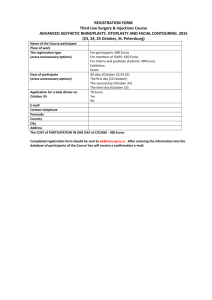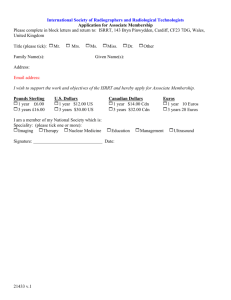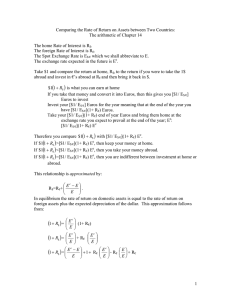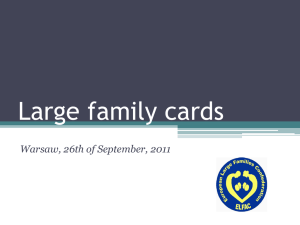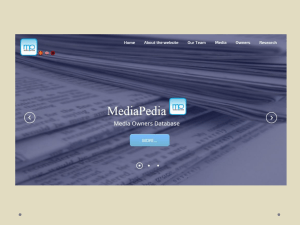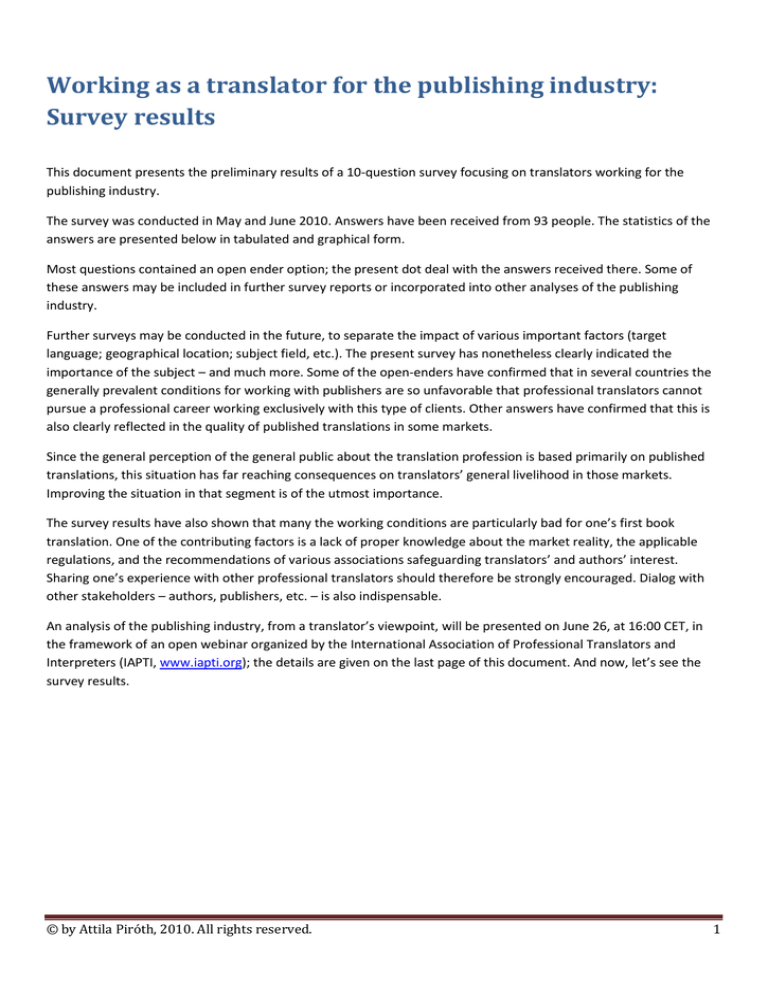
Working as a translator for the publishing industry:
Survey results
This document presents the preliminary results of a 10-question survey focusing on translators working for the
publishing industry.
The survey was conducted in May and June 2010. Answers have been received from 93 people. The statistics of the
answers are presented below in tabulated and graphical form.
Most questions contained an open ender option; the present dot deal with the answers received there. Some of
these answers may be included in further survey reports or incorporated into other analyses of the publishing
industry.
Further surveys may be conducted in the future, to separate the impact of various important factors (target
language; geographical location; subject field, etc.). The present survey has nonetheless clearly indicated the
importance of the subject – and much more. Some of the open-enders have confirmed that in several countries the
generally prevalent conditions for working with publishers are so unfavorable that professional translators cannot
pursue a professional career working exclusively with this type of clients. Other answers have confirmed that this is
also clearly reflected in the quality of published translations in some markets.
Since the general perception of the general public about the translation profession is based primarily on published
translations, this situation has far reaching consequences on translators’ general livelihood in those markets.
Improving the situation in that segment is of the utmost importance.
The survey results have also shown that many the working conditions are particularly bad for one’s first book
translation. One of the contributing factors is a lack of proper knowledge about the market reality, the applicable
regulations, and the recommendations of various associations safeguarding translators’ and authors’ interest.
Sharing one’s experience with other professional translators should therefore be strongly encouraged. Dialog with
other stakeholders – authors, publishers, etc. – is also indispensable.
An analysis of the publishing industry, from a translator’s viewpoint, will be presented on June 26, at 16:00 CET, in
the framework of an open webinar organized by the International Association of Professional Translators and
Interpreters (IAPTI, www.iapti.org); the details are given on the last page of this document. And now, let’s see the
survey results.
© by Attila Piróth, 2010. All rights reserved.
1
1. Have you ever translated a book for a publisher?
Yes, regularly
Yes, occasionally
No but I would like to
No and I am not interested
9
40
44
0
Yes, regularly
Yes, occasionally
No but I would
like to
© by Attila Piróth, 2010. All rights reserved.
2
2. Has it ever happened that you started to work on a book translation for a
publisher without a contract?
No
Yes, and I did not mind; publishers can be trusted
Yes; I took undue risk, but there were no problems eventually
Yes; I took undue risk and there were some problems
eventually
Other (please specify)
47
5
10
3
24
No
Yes, and I did not mind;
publishers can be
trusted
Yes; I took undue risk,
but there were no
problems eventually
Yes; I took undue risk
and there were some
problems eventually
© by Attila Piróth, 2010. All rights reserved.
3
3. In the negotiations of the terms with the publisher...
First book
Last book
21
12
6
8
I negotiated better terms than what they initially offered,
but the negotiated terms were still not advantageous for me
5
2
I was considered as an equal business partner,
so I negotiated the fair terms
1
8
I gave them my terms and conditions,
giving them a choice to take or leave them
4
4
I had the choice to take or leave the publisher’s standard terms
I was pleased with their standard terms,
so I had no problems with accepting them
Other (please specify)
I gave them my terms and
conditions, giving them a choice …
I was considered as an equal
business partner, so I…
I negotiated better terms than
what they initially offered, but…
Series2
Series1
I was pleased with their standard
terms, so I had no problems…
I had the choice to take or leave
the publisher’s standard terms
0
5
10
15
20
25
Series 1 = For the first book
Series 2 = For the last book
Comment: fewer replies and a marked improvement of the negotiating position for the last book.
© by Attila Piróth, 2010. All rights reserved.
4
4. The fee for the translation...
much lower that what I would ever offer to an agency or direct client
First book
Last book
23
3
considerably lower that what I charge to agencies or direct clients
a bit lower that what I charge to agencies or direct clients
about the same as what I charge to agencies or direct clients
somewhat higher that what I charge to agencies or direct clients
much higher that what I charge to agencies or direct clients
Other (please specify)
6
11
6
2
0
7
3
8
3
2
much higher that what I charge to
agencies or direct clients
somewhat higher that what I
charge to agencies or direct…
about the same as what I charge
to agencies or direct clients
Series2
a bit lower that what I charge to
agencies or direct clients
Series1
considerably lower that what I
charge to agencies or direct…
much lower that what I would
ever offer to an agency or direct…
0
5
10
15
20
25
Series 1 = For the first book
Series 2 = For the last book
Comment: fewer replies and a marked improvement of the negotiating position for the last book.
© by Attila Piróth, 2010. All rights reserved.
5
5. Approximately how much did you charge per thousand source words (in euros;
(please make rough conversions if necessary) for the translation...
First
Worst paid
Best paid
Average
6
5
3
0
2
1
0
1
2
1
1
0
1
0
0
0
1
1
2
1
2
2
0
0
0
0
0
0
1
0
0
0
0
0
0
0
1
1
0
1
1
2
0
0
1
1
0
0
1
0
4
2
3
5
1
0
3
3
1
2
1
0
2
0
0
0
1
0
I don't want to answer
Less than 10 euros per 1000 source words
10-20 euros per 1000 source words
20-30 euros per 1000 source words
30-40 euros per 1000 source words
40-50 euros per 1000 source words
50-60 euros per 1000 source words
60-70 euros per 1000 source words
70-80 euros per 1000 source words
80-90 euros per 1000 source words
90-100 euros per 1000 source words
100-110 euros per 1000 source words
110-120 euros per 1000 source words
120-130 euros per 1000 source words
130-140 euros per 1000 source words
140-150 euros per 1000 source words
More than 150 euros per 1000 source
words
Other (please specify)
More than 150 euros per 1000…
130-140 euros per 1000 source…
110-120 euros per 1000 source…
90-100 euros per 1000 source…
70-80 euros per 1000 source…
Series1
50-60 euros per 1000 source…
30-40 euros per 1000 source…
10-20 euros per 1000 source…
I don't want to answer
0
1
2
3
4
5
6
7
Series 1 = For the first book
© by Attila Piróth, 2010. All rights reserved.
6
More than 150 euros per 1000…
130-140 euros per 1000 source…
110-120 euros per 1000 source…
90-100 euros per 1000 source…
Series4
70-80 euros per 1000 source…
Series3
50-60 euros per 1000 source…
Series2
30-40 euros per 1000 source…
Series1
10-20 euros per 1000 source…
I don't want to answer
0
1
2
3
4
5
6
7
Series 1 = For the first book
Series 2 = For the worst paid book
Series 3 = For the best paid book
Series 4 = Average of all books
Comment: Relatively few replies. The data indicate that the first book is often worse paid than subsequent ones.
© by Attila Piróth, 2010. All rights reserved.
7
6. Is it possible for a professional translator to make a fair revenue from book
translations in your market?
Yes, the standard rates proposed by publishers allow that
Yes, but only if the translator can negotiate much better terms than what publishers propose
3
16
No, a professional translator working only for publishers will not be able to generate the
same revenue as a professional translator working for agencies and/or direct clients
28
No, a professional translator working only for publishers will not be able to generate a
revenue that is sufficient to support a family
7
No, a professional translator working only for publishers will not be able to generate a
revenue that is sufficient to support a family
4
No, a professional translator working only for publishers will not be able to generate a
revenue that is sufficient oneself
4
Other (please specify)
21
Other (please specify)
No, a professional translator working only for publishers will
not be able to generate a revenue that is sufficient oneself
No, a professional translator working only for publishers will
not be able to generate a revenue that is sufficient to support
a family
No, a professional translator working only for publishers will
not be able to generate a revenue that is sufficient to support
a family
No, a professional translator working only for publishers will
not be able to generate the same revenue as a professional
translator working for agencies and/or direct clients
Yes, but only if the translator can negotiate much better
terms than what publishers propose
Yes, the standard rates proposed by publishers allow that
0
© by Attila Piróth, 2010. All rights reserved.
5
10
15
20
25
30
8
7. Translation for publishers in my market is usually badly paid first and
foremost because...
the market is too small
distributors' share is excessively high
there are a lot of translators who are interested,
so the price pressure is high
16
13
8
there are many translators interested
for whom charging a fair price is not important
21
it is not badly paid
Other (please specify)
2
23
the market is too small
distributors' share is excessively high
there are a lot of translators who are interested, so
the price pressure is high
there are many translators interested for whom
charging a fair price is not important
it is not badly paid
Other (please specify)
© by Attila Piróth, 2010. All rights reserved.
9
8. How much were your “integrity rights” respected?
Not at all: I was not even aware of the changes made by the
publisher’s editor until I saw the book in print
16
Not at all: I was informed about the changes made by the
publisher’s editor (and/or the original author) before the book
came out but I was not consulted
5
Little: I could review the modifications proposed by the publisher’s
editor (and/or the original author), and we could discuss the points,
but the final word was theirs
11
They were respected: I had the final word about the modifications
proposed by the publisher’s editor (and/or the original author)
12
Other (please specify)
26
Other (please specify)
They were respected: I had the final word
about the modifications proposed by the…
Little: I could review the modifications
proposed by the publisher’s editor (and/or …
Series1
Not at all: I was informed about the changes
made by the publisher’s editor (and/or the …
Not at all: I was not even aware of the
changes made by the publisher’s editor until…
0
© by Attila Piróth, 2010. All rights reserved.
5
10
15
20
25
30
10
9. “Paternity rights”: The most prominent place where your (the translator’s)
name appeared is…
on the outside front cover of the book
in the inside cover of the book
on the back cover of the book
on the copyright page (“page 4”)
none of the above
Other (please specify)
3
24
2
11
12
18
Where did the translator's name appear?
on the outside
front cover of the
book
4%
Other (please
specify)
26%
none of the above
17%
in the inside cover
of the book
34%
on the
copyright
page
(“page 4”)
16%
© by Attila Piróth, 2010. All rights reserved.
on the back cover
of the book
3%
11
10. If you have any other comments, an own experience to share in detail, or
suggestions on how to improve the situation of translators who work for
publishers, please share. Feel free to disclose your identity or keep your
anonymity.
21 comments received; a selection may be published in a subsequent report.
© by Attila Piróth, 2010. All rights reserved.
12
Webinar on the publishing industry
Many thanks to Aurora Humarán for suggesting the inclusion of questions related to translators’ intellectual rights
(questions 8 and 9) and to everyone who participated in the survey.
Details of the IAPTI webinar are available at http://www.aipti.org/ourforum/calendar.php?action=event&eid=39.
The webinar is open and free – feel free to share the link with any colleagues who might be interested.
© by Attila Piróth, 2010. All rights reserved.
13

